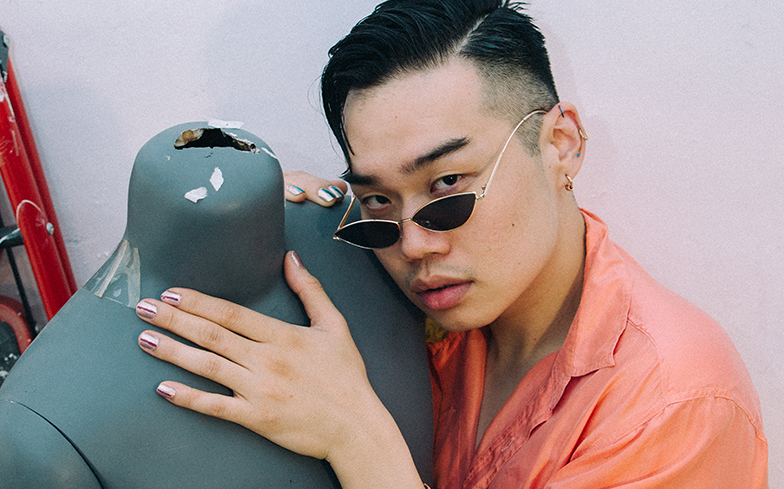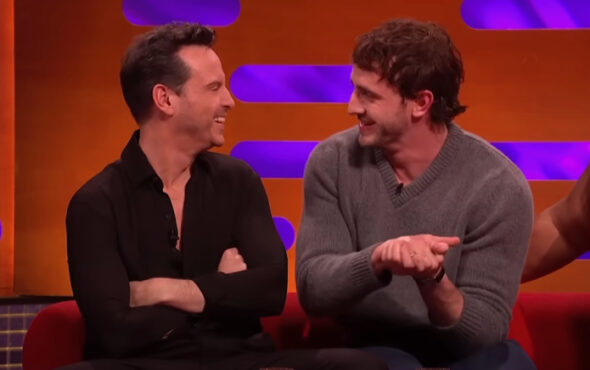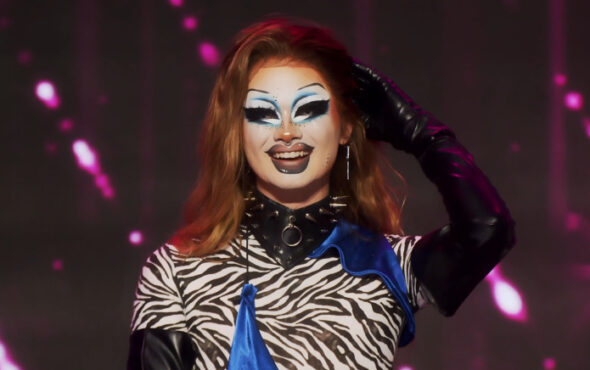
MRSHLL is breaking new ground, one step at a time.
The world of K-Pop may be known for the androgyny of its idols and the glitz-and-glam of the big-budget bangers they produce, but the fact remains that queer representation is almost non-existent in largely conservative South Korea.
MRSHLL is changing that. Widely regarded as the first K-Pop artist to come out as gay, the singer-songwriter first opened up about his sexuality in 2015 – despite being raised in an evangelical Christian household in America – and against all odds went on to sign with a Korean record label and release his debut EP, Breathe, earlier this year.
“Everyone that I’ve come across or come into contact with [in the industry] has been a lot more open-minded than people would think,” he tells Gay Times, although he does admit that he still experiences “micro-aggressive behaviours” in everyday life, largely as a result of ignorance towards the community.
To celebrate the release of his first official music video Pose, we sat down with MRSHLL to talk about the inspiration behind his music, finding the balance between his intersectional identities, and what life is really like for LGBTQ people in South Korea…
Congratulations on Breathe! How does it feel to finally have your own music out in the world?
You know what? I still can’t believe it’s out. I haven’t really had time to process the fact that the music is out there because I’ve been busy promoting it and marketing it and everything like that. But I’m so happy that it’s out there!
Where did you get your inspiration from when creating the album?
I continually write music and I’m constantly in the studio because I feel like I have so much to say about life and my experiences in general. I started working on this album – or parts of this album – early last year, and I actually had a different line up of songs ready to go but it ended up being pushed back. I decided not to rush, because I wanted to really take my time crafting the right thing, and that resulted in Breathe.
Where did the title Breathe come from?
I actually came up with the name for the album just two weeks before it came out. It was through a conversation with my mom. I was going through a lot of personal things in my life, I was kind of frustrated at how things were going with my music, and she told me, ‘Look, all your life you’ve let things take their own pace, you’ve never tried to force anything, so why are you trying to force something to come out now? Why don’t you just breathe and let it go’. So I took that to heart, and I went into the studio and wrote a song called Breathe – which actually didn’t end up making it onto this release, I’m saving it for the next one – but that song and the title of the album just really made sense. And then the following day I got a release date and it just moved forward from then on.
You’ve worked with a lot of respected names in the industry. How do you decide who to collaborate with?
The songs on Breathe came from a collaborative effort over the last year and a half with a bunch of different people who are some of my closest friends, and also people who I respect very deeply in the music industry. For example, there’s a song called Hold Me which I worked on with my friends David and Amy Kuney. Amy and I went to college together, she and I attended this private Christian university, and we both had these parallel journeys of figuring out our sexuality together. She’s now a singer-songwriter working with Kelly Clarkson, Tori Kelly, Akon, Michelle Branch, all these amazing people. So it was super rad to work with her, and it just happened so naturally the way we came together with the song. A lot of the other artists are people who are pretty big in South Korea, who I’ve known for most of my time here. So it’s been a process. A very enjoyable process.
Am I right in saying you worked with Lee Hi, too?
Oh my gosh, of course! My angel. She is my girl, she is one of the most dearest people to my heart, and she was also very instrumental in this album. My Korean isn’t as strong – because I was born and raised in the United States – and my ability to speak Korean only really improved after I came to Korea and had lived here for a few years. So lyrically, I still write everything in English first, and I kind of co-write with another writer or friend to get the Korean version of what I want to say out. And because Lee Hi is one of my closest friends, she also knows what I’ve been through in the past couple of years, and she was really monumental in helping me say what I needed to say and get my point across in the best way possible. She worked on the lyrical aspect of about three songs with me. I’m so thankful and super grateful for her and her friendship. She’s an incredible artist through and through.
We also have to talk about Pose, because it’s fabulous.
Yaaas! That song is actually one of the newest additions to my album. A lot of the other songs I’d been working on since last year, but Pose is a song that I wrote just two weeks before the album came out. I really wanted to write a song that was reflective of the joy that I was feeling at the time of being confident in who you are, so the song is all about self-love and self-acceptance. It’s just a very positive tune for myself, and something I can dance to! I’m super happy with how it turned out.
The song has definite queer undertones to it. Where did you get your inspiration from?
My inspiration actually came from a comment Lee Hi made on one of my photos on Instagram, she was like, ‘Pose!’ and it stuck in my mind. I thought, ‘What a great theme!’ So I was in the studio and I started writing the lyrics, and they just flew out. I wanted it to be a very Nile Rogers, disco-inspired sound. And of course I was thinking about our club culture as well, and I really wanted something dance-y. The rest of my songs on this current album are very chill and mellow, and very introspective – which is amazing, and something I very much enjoy doing – but I also love to dance. I’m not a dancer dancer, but I love to dance and it’s a very therapeutic thing for me. So that’s the inspiration I had when writing the song.
What was your creative process when bringing the music video together?
So this video is mixed media, it features video and animation, and it’s just an explosion of colours. My friend who I worked on the video with, his name is Geoff J. Kim and he’s from New York, he described it best as a combination between Grace Jones, K-Pop music and Andy Warhol. If you blend all those into a mixer with acid and disco funk, that’s literally what it is. It’s an extension of my soul, and an extension of what the song is about, and it really is a great interpretation of what I hope people are feeling when they listen to this song and dance to it. It’s also technically my first ever official music video.
Are you on a label or working independently?
I’m on a label, they’re called Feel Ghood Music, I signed with them last May and they’re based in Korea. They’re actually a hip-hop label, and it’s funny because I have this thing where I’ve become that one singer who hangs out with a lot of rappers and appears in a lot of rap songs, which I didn’t really realise until recently.
Many people would assume that rap and hip-hop as genres aren’t very accepting of LGBTQ people. Have you found this to be true?
Everyone that I’ve come across or come into contact with has been a lot more open-minded than people would think. Granted, there are still a lot of micro-aggressive behaviours that I experience in day-to-day life in Korea, but I think a lot of that has to do with ignorance and people not really knowing anything about LGBTQ culture or who we are as people. I feel like I’ve been doing a good amount of educating, in a way, because I seem to have become this ambassador of being gay in Korea. But at the same time, I feel like sexuality is so fluid, and even now there’s new definitions and new discoveries of sexuality and gender identity emerging all the time, so I don’t want to be the expert on everything LGBTQ – because I’m not, and I don’t claim to be. I’m still figuring things out myself. I think me being me, and talking to people, and releasing music as my true self; just that alone is opening up people’s minds and hearts.
How do you find a balance between your American and Korean identities?
There’s a lot of learning and figuring out Korean culture, and how that plays into things versus the way I was raised which was a watered down version of Korean culture plus the very strong American culture. Just within the past five years of living in Korea I’ve learned a lot about who I am as a person and my identity as a Korean/American LGBTQ person. There’s been a lot of ups and downs, but it’s all kind of led me to who I am today and the music that I make now.
What was your American upbringing like?
I was born and raised in Orange Country, California, which is right next to Disneyland. I would say I had a pretty average immigrant-family upbringing in America, but I also was heavily involved in the evangelical Christian church culture. My parents were very religious and went to church every Sunday. I didn’t really come to terms with or even acknowledge my sexuality at all until my early 20s, and even then I couldn’t say the word gay, I would say ‘same-sex attraction’. That was the only language that I could use at the time. So I pretty much pushed it down for all those years, and as time started changing and people were a little bit more open and I was experiencing more things outside of the church, I came across people that were like me. I went to hair college at one point, and I experienced my first gay club and my first gay friends. That was where I realised, ‘Oh, the way I was raised and the people I was told were evil, like people with tattoos or people in the gay community, obviously that’s not the case’. As I had real conversations and real relationships with the community, the fear I had went away. It was definitely a process, and it took some time for me to get comfortable with myself and other gay people. The funny thing is that I came out to my family just a few months before I even moved to Korea, so most of my fully ‘out’ gay experiences happened while I was in Korea, which is pretty crazy since Korea is a lot more conservative than America.
How was it making that move to a more conservative country? Did you notice a change?
I think at that point I had been so far inside the closet, and had suppressed and oppressed myself for so long, that I didn’t really care what anyone thought. But at the same time I didn’t think it was necessary for me to broadcast it to everybody and wear a rainbow flag on my shirt and say, ‘Hi guys, I’m MRSHLL and I’m gay!’ you know? And while it is wrapped up in who I am, it’s just a non-issue for me, it’s not a big deal. Who cares? I honestly don’t understand why it’s such a big deal. But because so many people think it’s a big deal, that’s pushed me to be more vocal about it, to an extent.
What is the situation like for LGBTQ people in South Korea?
Well, the country itself hasn’t been around for long, they technically gained independence in 1945 and had this crazy Korean war during the 1950s, and then they built this country from the rubble, all the way up to where they are now today. So in about 70 years they went from a third-world country to this major economic power, and while technologically everything grew really fast and everything’s so modern now, culturally not so much. For example, my grandma was born in the 1920s which means she was born in colonial Korea, under Japanese rule, and that generation are still alive. Every 10 years, Korea has turned into a different country, basically, so it’s no wonder there’s such a big gap in the way people think. My generation has a different way of thinking than our parents do, and they have a different way of thinking than their parents do. So it’s just difficult trying to navigate that. There are people from my parent’s generation who don’t acknowledge the whole ‘gay thing’ – for them it’s a western-created thing, and it’s not real. Gay people and trans people have always been here, we’ve always been around, but people have been too busy trying to survive and make money to eat and provide for their families, so they were never really thinking about sexuality or gender identity. I think that’s why now, in this day and age, things are moving forward in that area, because people are doing well, if that makes sense.
Aside from you and Holland, are there any other openly gay artists in South Korea?
Not that I know of. But hey, please everyone come out into the light and join the club, because it’s really lonely! The more the merrier, I say.
In America and the United Kingdom, the music scene has really embraced black artists and their music, but there’s a complete lack of Asian artists on the charts. Why do you think this is?
I’ve been racking my brain about this, and you know what? I honestly could not even come up with 10 people, where if I were to go to some middle-of-nowhere village in the UK or the mid-west in America, that they would know who they were. There’s maybe Jackie Chan, Lucy Liu, and Steven Yun from The Walking Dead? But there really isn’t anyone out there, and just that alone means there’s a problem. While there are a lot more films and TV shows and music scenes that are starting to move forward in terms of representation, it’s still slow going. Like, we’re only just now getting our first black superhero in a major Hollywood film with Black Panther. There’s not a lot of roles out there written for people of colour in general, let alone the other people of colour outside of black people. So there needs to be more of that, and I think the only way to do that is to write these stories ourselves, whether that be music or books or art or film. Just little by little I think things are moving forward. We’re doing better than 10 years ago, where there was pretty much nothing, but we need to do better!
Would you be up for trying to break into the western market with your music?
I would love to, and that’s definitely the long-term goal of what I want to do. But at the same time, I don’t think America – and the west in general – are ready, or would even know what to do with an Asian artist. I mean, there are glimmers of hope with people like Rina Sawayama, she’s super dope, and with Hayley Kiyoko – who’s also a proud lesbian, and I fucking love that. But that’s two people, you know? We’re literally searching for people. But I do think now is the time, and hopefully there’s more to come in the future, and I am definitely gonna make more music in English. Let’s make this shit happen!
MRSHLL’s debut EP, Breathe, is available to stream on Apple Music and Spotify now.
Images: Yunho Jo / Neon Milk







